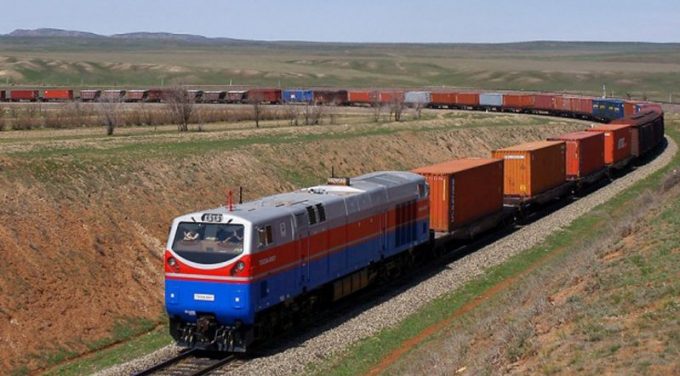Maersk Frankfurt heads for open water as container fire subsides
Maersk Frankfurt, the newbuild box ship that suffered a possible electrical fault and subsequent container ...
TFII: SOLID AS USUALMAERSK: WEAKENINGF: FALLING OFF A CLIFFAAPL: 'BOTTLENECK IN MAINLAND CHINA'AAPL: CHINA TRENDSDHL: GROWTH CAPEXR: ANOTHER SOLID DELIVERYMFT: HERE COMES THE FALLDSV: LOOK AT SCHENKER PERFORMANCEUPS: A WAVE OF DOWNGRADES DSV: BARGAIN BINKNX: EARNINGS OUTODFL: RISING AND FALLING AND THEN RISING
TFII: SOLID AS USUALMAERSK: WEAKENINGF: FALLING OFF A CLIFFAAPL: 'BOTTLENECK IN MAINLAND CHINA'AAPL: CHINA TRENDSDHL: GROWTH CAPEXR: ANOTHER SOLID DELIVERYMFT: HERE COMES THE FALLDSV: LOOK AT SCHENKER PERFORMANCEUPS: A WAVE OF DOWNGRADES DSV: BARGAIN BINKNX: EARNINGS OUTODFL: RISING AND FALLING AND THEN RISING

Shippers are cancelling China-Europe rail freight bookings amid intense speculation that sanctions could prevent cargo transiting Russia.
According to Scan Global Logistics, China-Europe rail freight remains operational “for now”, despite crossing Russia and Belarus.
The forwarder said: “Russian Railways is included on the sanctions list from the US, however, there is no ban on transport via Russia as we speak.
“Most of the focus is on the potential impact of Russia being excluded from the SWIFT payment system and how China’s rail freight providers will respond to this. For now, it is considered that transactions can still take place.
“But it is foreseen that rail freight eventually will be impacted, and delays will come.”
Indeed, whether sanctions will force trade through Russia to stop may be a moot point, given the unilateral risk-mitigation shippers and forwarders are likely to take.
For example, Flexport immediately stopped taking bookings for its trans-Siberian rail road service and, yesterday Maersk – a strong proponent of the Russian rail route, given it avoids congestion hotspots on the China-Kazakhstan border – announced its intercontinental rail to-and-from Russia would be temporarily suspended.
Jacky Yan, founder and CEO of New Silk Road Intermodal, said shippers had started cancelling bookings due to fears over sanctions and insurance.
He told The Loadstar: “Currently, most trains are passing through Russia and Belarus to Poland, so the service remains unaffected. Likewise, the train which used to pass through Ukraine has been diverted to Malaszewicze in Poland, and the train to Kyiv has been stopped because of the war.
“Sanctions against Russia have caused payment issues for US dollars, we have seen some cancelled bookings because of this, and some cancelled bookings because of worries about damage to the cargo.”
One Taiwanese electronics manufacturer has suspended bookings with China Railway, citing fears its cargo could end up “stuck on the Russia-Poland border”.
Lars Jensen, founder of Vespucci Maritime, said that, unless there was a major change in the Russia-Ukraine war, “it seems clear that all shippers, carriers and forwarders need to at least have contingency plans in place for a complete cessation of services to Russia, potentially within a matter of days”.
China-Europe rail freight has become increasingly popular over the past two years, given the Covid-crisis and impact on sea and air freight, and last year volumes surged 29%, to 1.46m teu.
“The largest potential ripple effect now would be if the overland rail link from China to Europe was halted,” said Mr Jensen. “Right now, the flow on the rail link is roughly 500,000 teu. If this stopped it would add almost 10,000 teu a week of demand onto Asia-Europe [ocean] services, where it would compete for space on vessels which are already full.
“The cargo on the rail line is typically where the shipper has a high focus on speed and a willingness to pay higher freight rates, and hence, if this cargo was redirected onto ocean services, it might price-out some of the lower-value cargo on those vessels.”
Comment on this article